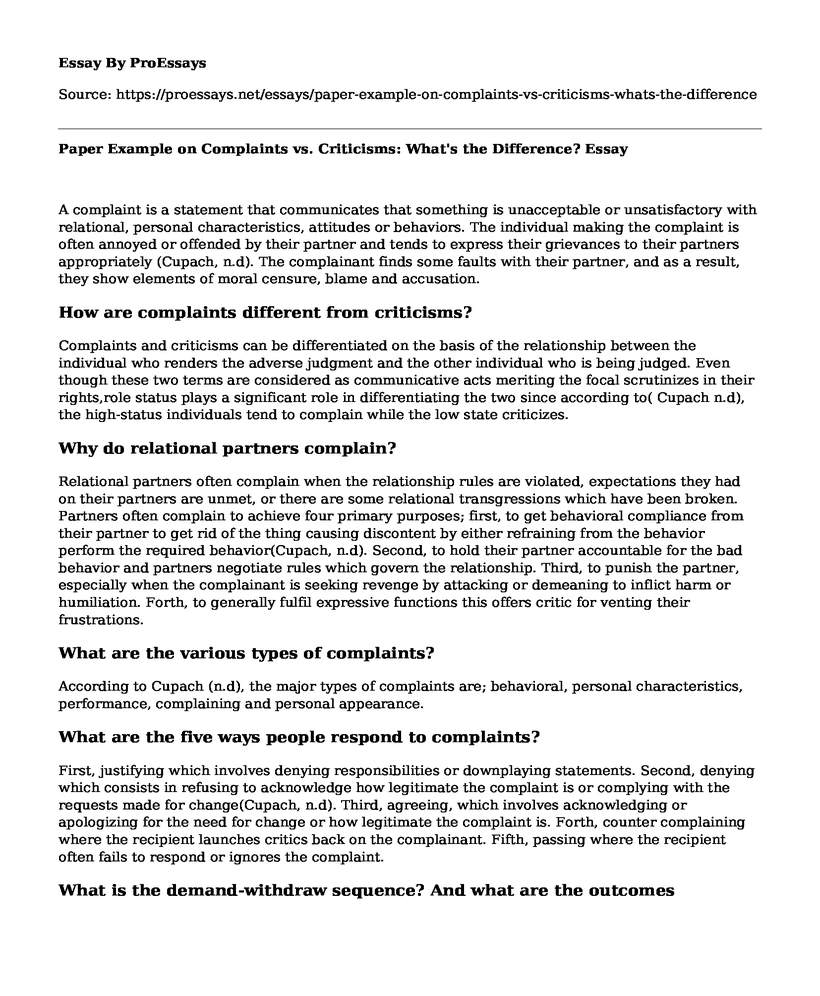A complaint is a statement that communicates that something is unacceptable or unsatisfactory with relational, personal characteristics, attitudes or behaviors. The individual making the complaint is often annoyed or offended by their partner and tends to express their grievances to their partners appropriately (Cupach, n.d). The complainant finds some faults with their partner, and as a result, they show elements of moral censure, blame and accusation.
How are complaints different from criticisms?
Complaints and criticisms can be differentiated on the basis of the relationship between the individual who renders the adverse judgment and the other individual who is being judged. Even though these two terms are considered as communicative acts meriting the focal scrutinizes in their rights,role status plays a significant role in differentiating the two since according to( Cupach n.d), the high-status individuals tend to complain while the low state criticizes.
Why do relational partners complain?
Relational partners often complain when the relationship rules are violated, expectations they had on their partners are unmet, or there are some relational transgressions which have been broken. Partners often complain to achieve four primary purposes; first, to get behavioral compliance from their partner to get rid of the thing causing discontent by either refraining from the behavior perform the required behavior(Cupach, n.d). Second, to hold their partner accountable for the bad behavior and partners negotiate rules which govern the relationship. Third, to punish the partner, especially when the complainant is seeking revenge by attacking or demeaning to inflict harm or humiliation. Forth, to generally fulfil expressive functions this offers critic for venting their frustrations.
What are the various types of complaints?
According to Cupach (n.d), the major types of complaints are; behavioral, personal characteristics, performance, complaining and personal appearance.
What are the five ways people respond to complaints?
First, justifying which involves denying responsibilities or downplaying statements. Second, denying which consists in refusing to acknowledge how legitimate the complaint is or complying with the requests made for change(Cupach, n.d). Third, agreeing, which involves acknowledging or apologizing for the need for change or how legitimate the complaint is. Forth, counter complaining where the recipient launches critics back on the complainant. Fifth, passing where the recipient often fails to respond or ignores the complaint.
What is the demand-withdraw sequence? And what are the outcomes associated with this sequence?
The demand-withdraw sequence involves one person nagging, criticizing, blaming as the other person tries avoiding the issue. Even though demanding causes withdrawal, withdrawal can also evolve demand(Cupach, n.d). The sequence leads to relationship dissolution and dissatisfaction.
What are the six distinct patterns of complaint episodes?
First, refocused whereby the responsibility of the problem is often shifted to a different source. Second, passed in which the recipient tends to ignore the complaint made. Third, responsive this involves the validation of the complaint. Fourth, unresponsive, which consists of challenging the validity of the claim (Cupach, n.d). Fifth, mitigated where the complainer downgrades how severe the complaint is. Sixth escalated, the counter complaints were lodged with the interaction been marked by sarcasm and hostility.
Why are complaints face-threatening acts?
Complaints are face-threatening acts since they challenge the face wants of the interlocutor by threatening the face of the speaker or that of the hearer(Cupach, n.d). The threatening can either be a negative or positive face.
On page 151, the author identifies factors that affect the aversiveness of complaints. Name and describe one of these factors.
Dispositional characteristics: it refers to the individual components that tend to influence the actions or behaviors of an individual(Cupach, n.d). For instance, genetic temperaments and personality traits; all these influences an individual's sensitivity to face a threat.
Why do people withhold complaints? And what are the consequences for withholding complaints?
People withhold complaints because first, some conflicts tend to be effectively irresolvable and second, the costs which often arise from as partners try to resolve others can be very severe to justify solving them (Cupach, n.d). The significant consequence associated with withholding complaints is that it leads to failure to resolve most of the perceived problems.
Can you think of a "bright side" to complaining in a relationship?
Complaining in a relationship is essential since it enables the complaint partner to verbalize their dissatisfaction, especially when they think that complaining can help reduce discrepancy and also alleviate the individual's feelings of distress.
Reference
Cupach, W. R (n.d). "You're Bugging Me" Complaints and Criticism from a Partner. Illinois State University.
Cite this page
Paper Example on Complaints vs. Criticisms: What's the Difference?. (2023, May 08). Retrieved from https://proessays.net/essays/paper-example-on-complaints-vs-criticisms-whats-the-difference
If you are the original author of this essay and no longer wish to have it published on the ProEssays website, please click below to request its removal:
- Research Paper on Change in Interracial Marriages Perception in the U.S.
- Unlawful Conversion of the Property Case Study
- Minimum Mandatory Sentencing Essay Example
- Essay Example on 21st Century: Human Rights Legitimacy Crisis?
- Protecting Public Property: Understanding the Taking Clause in the US Constitution
- Essay Sample on Origins of International Civil Service: 1919-1920
- Women, Guns and Personal Safety: Essay Sample on Linda Hasselstrom's Debate







